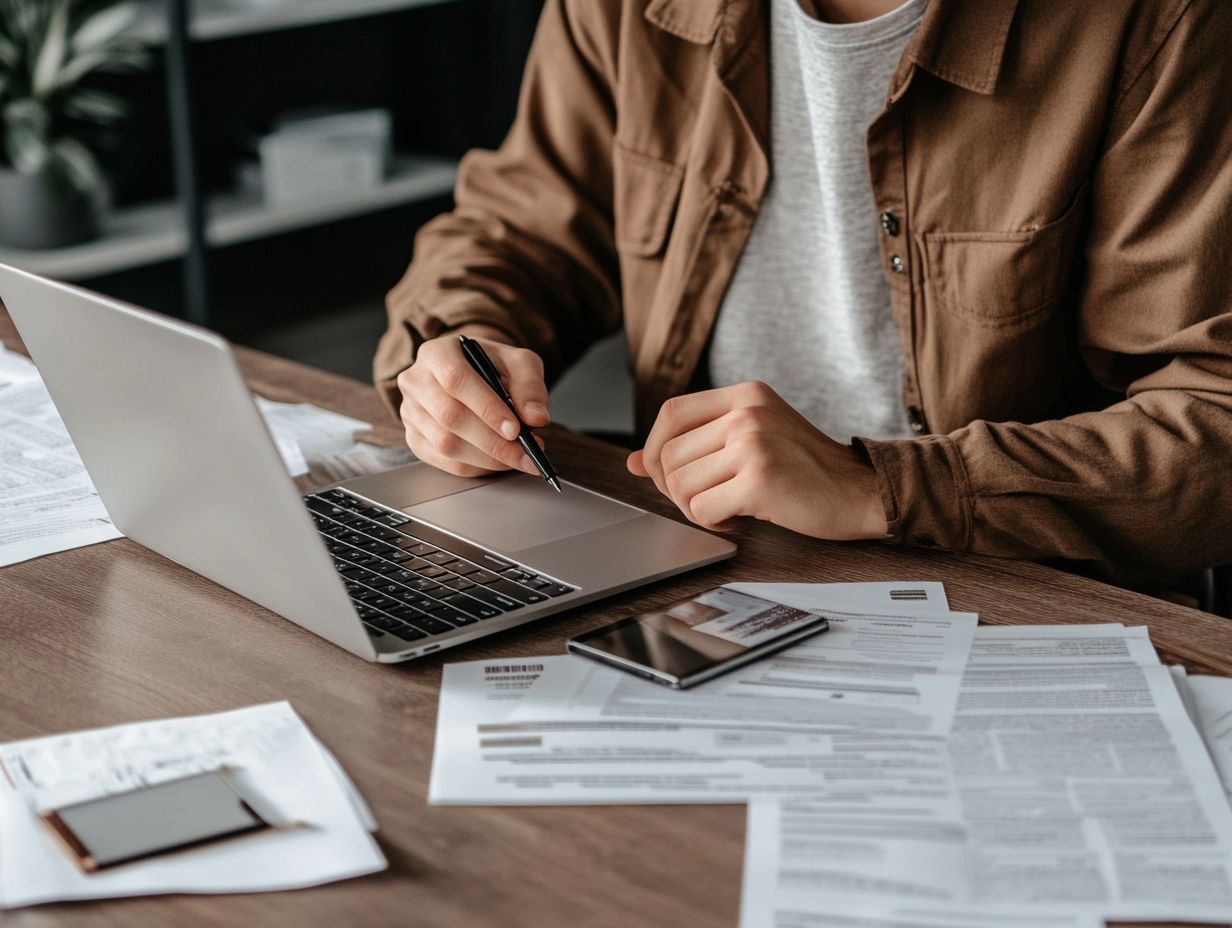How to Negotiate Trade-In Values
When you’re upgrading your vehicle, grasping the intricacies of trade-in values can profoundly impact the overall deal you secure.
This guide delves into what trade-in values entail and the various factors that influence them. It prepares you for negotiations with insightful tips on researching your vehicle’s worth and presenting it in the best light!
You’ll discover effective negotiation tactics and explore alternative options, whether you decide to sell privately or visit a different dealership. Arm yourself with the knowledge necessary to maximize your trade-in value!
Contents
- Key Takeaways:
- Understanding Trade-In Values
- Preparing for Negotiations
- Negotiating with the Dealer
- Alternative Options for Trade-Ins
- Frequently Asked Questions
- What is the importance of negotiating trade-in values?
- How do I prepare for negotiating trade-in values?
- What factors affect trade-in values?
- Should I negotiate my trade-in value before discussing the price of the new car?
- Can I negotiate my trade-in value even if I still owe money on my current car?
- What should I do if I am not satisfied with the trade-in value offered by the dealer?
Key Takeaways:

Research and understand the trade-in value of your vehicle before negotiating with a dealer.
Clean and maintain your vehicle to increase its trade-in value.
Be prepared to negotiate effectively and be aware of common tactics used by dealers.
Understanding Trade-In Values
Understanding trade-in values is crucial for anyone thinking about upgrading their vehicle. This is especially important when considering the financial impact of buying a new one.
The condition of your used car ranging from any car problems to recent repairs along with the dealership’s current offers, plays a significant role in determining trade-in value.
Utilizing resources like Kelley Blue Book and Edmunds can offer invaluable insights into your vehicle’s worth, informed by its history, maintenance records, and any potential recalls.
This knowledge empowers you to negotiate with confidence and secure competitive quotes from various dealerships.
What are Trade-In Values?
Trade-in values are the amounts that dealerships are prepared to offer for your used car when you’re in the market for a new vehicle. These values reflect both market demand and the condition of your vehicle.
It’s crucial for you to understand these values, as they directly influence the overall cost of your new purchase. A favorable trade-in value can significantly reduce the cash you need to fork out for a new car, making it a smart financial move on your part.
On the flip side, for dealers, accurately assessing trade-in values is essential for maintaining their profit margins while ensuring that you feel you re getting a fair deal.
Leveraging resources like Kelley Blue Book and Edmunds can be incredibly beneficial in this process. They provide you with up-to-date market insights and help both you and the dealer arrive at a fair value based on current trends and your vehicle’s history.
Factors that Affect Trade-In Values
Several factors influence your trade-in values, including the overall condition of your car, any existing car problems, and how well it has been maintained, as reflected in your maintenance records.
Additionally, how your car looks from the outside plays a critical role during the evaluation process. If the exterior is scratched or the interior shows wear and tear, you might find yourself facing a lower offer.
Market demand for specific makes and models can fluctuate, impacting your trade-in values accordingly. For instance, vehicles with a solid reputation for reliability often command higher bids.
It s also crucial for you to stay informed about any recalls, as unresolved issues can deter potential buyers, leaving you with less favorable trade-in options.
Preparing for Negotiations
Preparing for negotiations is an essential step in securing the best trade-in value for your vehicle. Thorough research and a polished presentation can profoundly influence your final offer, especially when you know how to negotiate with car dealerships.
Begin by investigating your vehicle’s value through reputable platforms like Kelley Blue Book and Edmunds. These resources offer valuable insights into the current market and assist you in setting realistic expectations.
Make sure your car is impeccably clean to enhance its appeal; curb appeal significantly affects how dealerships assess its worth. Collecting competitive quotes from multiple dealerships will also bolster your position during negotiations, giving you the upper hand.
Get ready to negotiate and secure the best deal for your vehicle today!
Researching Your Vehicle’s Value

Researching your vehicle’s value is key to a favorable trade-in deal. Use resources like Kelley Blue Book and Edmunds for invaluable insights.
These platforms show current market trends. They help you assess your vehicle’s worth based on make, model, year, and condition.
Mileage, accident history, and overall wear matter too. These factors contribute significantly to your vehicle’s perceived value.
Use the comprehensive data these sites provide. You ll confidently interpret pricing trends and negotiate from a position of strength.
Understanding vehicle valuation can impact the final offer. This knowledge ensures a satisfying trade-in experience.
Cleaning and Maintaining Your Vehicle
Cleaning and maintaining your vehicle boosts its curb appeal. This can maximize your trade-in value if there are no significant mechanical issues.
A thorough cleaning creates a lasting first impression. A clean vehicle is more enticing to potential buyers.
Providing maintenance records shows your responsibility. This builds trust regarding the vehicle s condition.
Proper detailing highlights the car’s features. It can also conceal minor wear and tear, enhancing perceived value.
A well-maintained vehicle prompts dealers to offer a better price. It reflects positively on you and the car’s history.
Negotiating with the Dealer
Negotiating with the dealer can feel challenging. But with the right strategies, you can advocate for better trade-in value.
Begin by using your research on your vehicle’s worth. Be ready to discuss any mechanical issues, showing knowledge of its condition.
Familiarize yourself with common dealership tactics. This preparation empowers you to counter effectively.
Tips for Effective Negotiation
Effective negotiation relies on preparation, confidence, and strategy. Understanding the trade-in process can significantly help you secure the best trade-in value.
Before discussions, research your vehicle’s market value. Understanding trends that impact trade-ins is crucial.
Having quotes from multiple dealerships strengthens your position. This authority enhances your conversation.
Practice assertive communication to convey your points. This fosters trust and creates a conducive atmosphere for agreement.
Common Tactics Used by Dealers
Dealerships often use tactics that influence trade-in value. To navigate this process successfully, it’s important to understand what to know about trade-in value. Being prepared is crucial for effective negotiation.
Lowball offers are a common strategy. The initial price may be below market value to catch you off guard.
Pressure tactics create urgency, making you feel compelled to accept quickly. Stay calm and be ready to walk away if the offer isn t acceptable.
Research your vehicle s market value beforehand. Stand firm on your price to protect your interests and secure a better deal.
Alternative Options for Trade-Ins

Exploring alternative options for trade-ins gives you more flexibility and could lead to better financial outcomes when selling or trading in your vehicle.
While traditional dealerships offer convenience, platforms like Carvana and CarMax provide competitive quotes and might simplify the sales process.
Understanding the pros and cons of each option helps you make informed decisions that align with your financial goals.
Selling Your Vehicle Privately
Selling your vehicle privately often results in a higher return than trading it in at a dealership. Private sales typically allow for more negotiation and flexibility.
However, this process comes with challenges. You ll need to research to find a suitable asking price that balances market value and your expectations.
Effective marketing is essential. Craft a compelling advertisement with high-quality photos and detailed information to attract potential buyers.
Preparing your vehicle for sale cleaning, servicing, and gathering necessary documentation can really make it stand out!
When buyers see value and transparency, they re more likely to engage. This can lead to smoother transactions and greater satisfaction for everyone involved.
Trading-In at a Different Dealership
Trading in your vehicle at a different dealership can yield a better trade-in value than local options. Research and gather competitive quotes to maximize your return.
This is important because dealerships have unique pricing strategies and inventory needs that can impact the offers they extend.
By exploring a range of dealers, you can leverage these insights to secure a better deal.
Don t wait! Seek multiple quotes and consider the overall reputation of the dealership during negotiations.
Visiting dealerships with strong online presences and positive reviews can greatly increase your chances of finding a trustworthy partner who values your trade-in appropriately.
Being informed and proactive in your search can lead to advantages that enhance the entire trading experience.
Frequently Asked Questions
What is the importance of negotiating trade-in values?
Negotiating trade-in values can save you a significant amount of money when purchasing a new car. To maximize your savings, it’s also beneficial to understand how to negotiate a car lease, as a higher trade-in value for your current vehicle reduces the overall cost of your new vehicle.
This allows you to get the most value for your car, especially if it is in good condition.
How do I prepare for negotiating trade-in values?

Before negotiating, do your research on your car’s current market value. This will help you understand what your car is worth and set realistic expectations for your trade-in value. For more insights, check out these negotiation tips for used car buyers.
Cleaning and fixing any minor issues with your car improves its condition and overall value.
What factors affect trade-in values?
The make, model, year, mileage, condition, and demand for your car all influence its trade-in value. Cars in high demand and good condition typically have higher trade-in values.
On the other hand, older cars with high mileage and known mechanical issues usually have lower values.
Should I negotiate my trade-in value before discussing the price of the new car?
Yes, it s best to negotiate your trade-in value separately from the new car price. This way, you secure the best value for your trade-in, unaffected by the new car’s price.
This approach allows you to focus on one negotiation aspect at a time.
Can I negotiate my trade-in value even if I still owe money on my current car?
Yes, you can negotiate your trade-in value while still owing money on your car. Keep in mind that the remaining balance on your loan will be deducted from your trade-in value.
You might also roll over the remaining balance into your new car loan, but this may not always be the best financial decision.
Start researching your trade-in options now to maximize your benefits!
What should I do if I am not satisfied with the trade-in value offered by the dealer?
If you’re unhappy with the trade-in value, try negotiating with the dealer. They may be willing to offer you more.
Selling your car privately could unlock a much better deal! This might get you a better price.
Keep in mind that this will take more time and effort.
Get quotes from other dealers to compare trade-in values. You might find a better offer!






